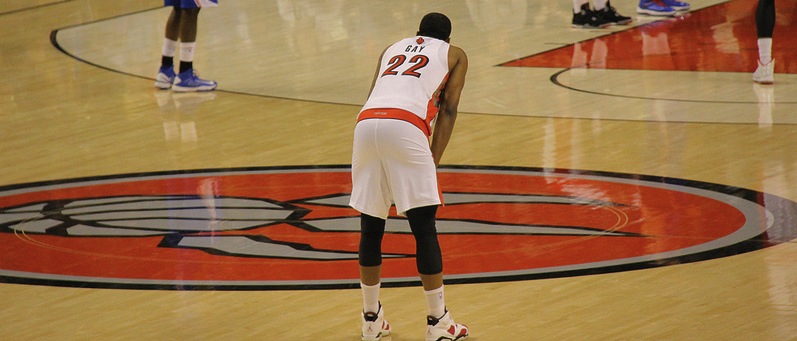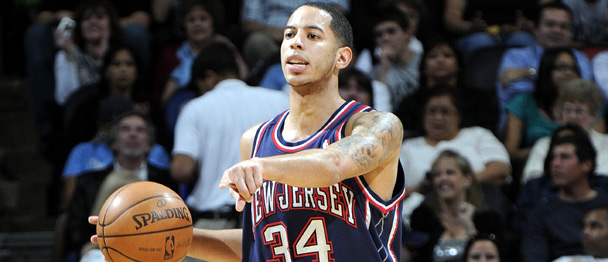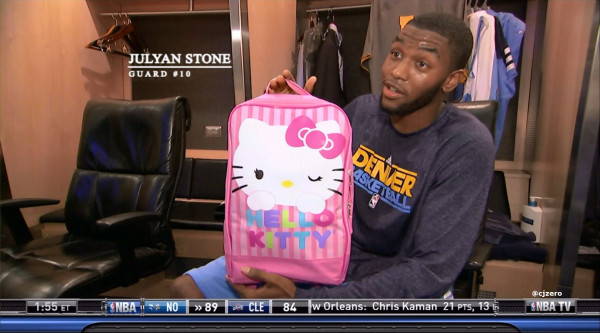On this morning’s Rapcast I mentioned that I don’t think trading Rudy Gay for expiring contracts makes any sense, for various reasons.
The comments to that post have been such that I feel like I need to explain that stance further.
Foremost, I’m anti-tanking. Yes, it’s Andrew Wiggins, but there’s only a 25% chance the last place team gets the number one pick. Yes, it’s supposed to be a good and deep draft class, but a) who knows how the year will play out, and b) does this mean an eighth pick, for example, will still be franchise altering? And yes, the Raptors as currently constructed are, in the absolute most optimistic scenario, a second round playoff team, and that doesn’t quite cut it in the eyes of some fans.
However, there are already a handful of teams lined up to tank. This not only increases the difficulty in acquiring strong lottery odds by increasing the loss total necessary, but it also significantly lowers the barrier to entering the playoffs. The playoffs bring additional revenues that are mostly profit, and MLSE is in the business of making money. Since I don’t really care about the linings of their pockets, playoffs also bring additional excitement, make the team more attractive to free agents and help develop the players on the roster.
So to review:
*major competition for tanking
*low barrier to entry for playoff ball
*no certainty of franchise improvement with tanking
The argument holds that it’s really difficult to win an NBA Championship without at least one superstar. I understand that reality and I understand Wiggins could be that guy one day. But Masai Ujiri showed in Denver, like Indiana showed this year, that you don’t need a superstar to be a pretty good team. If you’re okay with the Raptors building to being “pretty good,” then making improvements without tanking is attractive. Of course I’d love a championship, but I’d also be ecstatic to just cheer for a team that is “pretty good” or even “really good” instead of “perpetual lottery fodder.”
And I think Ujiri has the mindset and the assets in place to make the team better in small steps. That is, there’s a path to making the team better without tanking. That may very well include trading Rudy Gay, but not for expiring contracts alone.
The deal I’m referring to here is the rumoured offer of Charlie Villanueva and Rodney Stuckey the Pistons sent Ujiri’s way. The only world in which that’s an acceptable offer is one in which the goal is clearly tanking – as polarizing as Gay may be, he’s still a pretty good NBA player. Yes, he’s overpaid, but he’s a net positive for the team. One would think Ujiri would at the very least require some form of draft pick or young player compensation to entice him to move Gay.
And that’s because Gay, although expensive, isn’t too cumbersome a contract to keep around. He’s due $17.9M this season and has a player option for $19.3M for 2014-15. If he exercises the option, well, it’s another year of paying superstar money to a guy who is good but not elite. That’s unfortunate, but it would also make him a huge expiring contract to deal (an attractive means of acquiring assets from a rebuilding team). In addition, there’s the chance he doesn’t exercise said option.
This is, I think, the issue that most people had with my stance against the trade. People see “$19.3M option” and it’s difficult to envision a situation in which Gay declines it.
But it’s entirely possible, and not all that ridiculous. Look at these three possible career arcs for Gay:
1) Exercises option, gets hurt in 2014-15, can’t sign a big money deal and has to play on a David West-like “prove it” contract before getting big money again (if he ever can – see Josh Howard as an example).
2) Declines option, signs 4-year, $48M contract (not unrealistic given the money just offered to Tyreke Evans and Andre Iguodala), hits free agency again at age 31.
3) Exercises option, plays well enough, signs free agent deal at slightly less than scenario 2 but more than scenario 1.
Those aren’t an exhaustive list of possibilities, but they’re probably the three most prominent ones Gay and his agent would consider. The decision will come down to how well Gay plays this year and his own personal risk preference – $19.3M for a year sounds really good, but $48M guaranteed sounds even better and is, you know, guaranteed.
If you don’t think Gay would get $48M over four years, consider the 4-year, $56M deal Andre Iguodala was allegedly offered by the Kings. It’s been taken off the table, but some ESPN contributors pegged 4-48 as the lowest Iggy could expect.
Iguodala is a better player than Gay, especially on the defensive end, but he’s also two years older than Gay will be next summer. Gay had a higher PER and rebound rate, a lower turnover rate and similar block and steal numbers. Iggy had the edge in True Shooting Percentage, assist rate and, of course, defense (pick your stat, or just use your eyes or reputation or whatever). Iggy is better, but he’s older. Whether you see value in it or not (I don’t), Gay also has the “clutch” reputation. He can also create his own shout and score in bulk more capably than Iguodala.
All of that is to say that Gay will have suitors, and if he has a strong 2013-14 it might be in his best long-term financial interest to decline his player option.
The possibility of that move makes dealing him strictly for expiring contracts, without receiving any additional assets in return, ludicrous. The team would be swapping him out for lesser players to avoid potentially paying him in 2014-15, clearly signalling a tank (and even then, not a good one considering you’d still want to receive some sort of future asset in the deal).
I understand that some people are a part of Tank Nation and as such won’t agree with holding Gay no matter what. There are others who might want Gay traded regardless. I’d suggest taking a more realistic view at what tanking for 2013-14 is really providing the team while reconsidering what Gay’s trade value might be beyond expiring contracts.
I’m not against dealing him, but the return needs to tangibly help the team moving forward, not just save some money for a hypothetical free agent and improve the odds of potentially landing a hypothetical superstar, however certain said star might seem. See how many probability-qualifying words I had to use there? That’s why I feel how I do about tanking.



